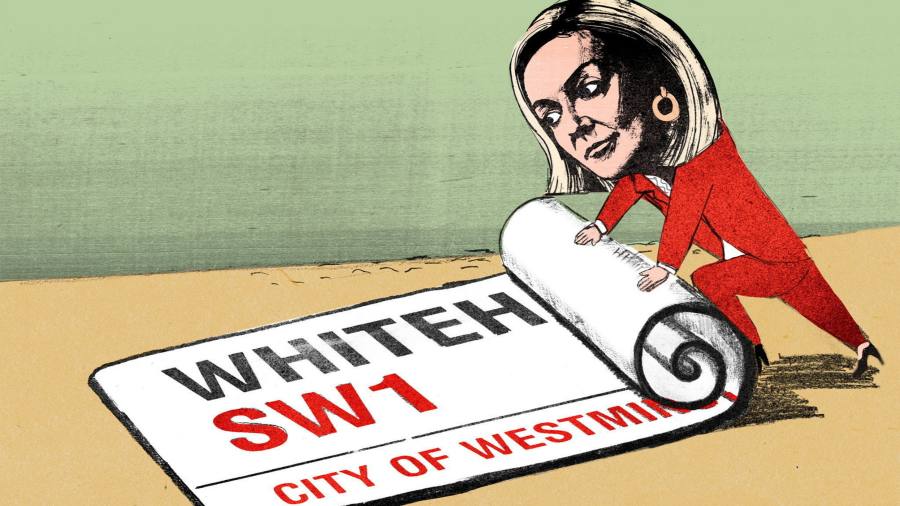
Scrapping the cap on bankers’ bonuses while holding down pay for nurses; ditching increases in corporation tax; resisting new windfall levies on energy firms and disavowing ideals of redistribution; to anyone of left or centrist sentiment, Liz Truss’s Conservatives appear to have a death wish.
No matter that she has delivered, against her instincts, a gargantuan energy bill “handout”, the new prime minister’s opponents are gleeful at what they see as ideological missteps.
Yet, whatever the moral arguments, it is possible to see a political strategy which coalesces into an electorally appealing narrative for Tory-minded voters — though whether it succeeds depends on factors Truss cannot control, namely the state of the economy and the length of the energy price crisis.
And one important corrective is needed. Progressive pundits and politicians have proved themselves historically weak at predicting which Tory policies will enrage people. Bankers earning more may rankle but unless voters see a direct relevance to their own lives, the political risks are limited.
The issues that lose support are those that people feel themselves — the cost of living, NHS waiting times, crime. If the government fails here, then being seen as the party of the rich will further weaken it. If not, the public will most likely mutter and move on.
In the drive to reduce taxes, cut regulation and pare back what Conservatives like to describe as “nanny-state” policies such as anti-obesity measures, Truss is developing a clean argument and one with historical appeal to Tory voters. A Conservative government, she will say, is there when you need it but the rest of the time it gets out of your way. In a crisis, it will deliver a furlough or an energy package, but the ambition is to cut your taxes, free you from meddling and let job creators and hard workers thrive. The energy support provides cover for the tax cuts. The Tory message is freedom with security.
Here is a story that can fly. Truss even embraces the unpopularity of some policies, believing they signal a leader-like readiness to defy convention and take tough decisions. For all the small-state rhetoric though, the policies are notably less radical when it comes to certain Tory-leaning voter groups like pensioners or suburban homeowners. They also rely heavily on deficit financing to prop up those core public services.
This narrative is closer to both the buccaneering Brexit government, of which many Tories dreamt, and the ideals of those longstanding, more affluent supporters who the party fears losing in southern seats. Nor is it unhelpful for Conservatives to once again seem to give a damn about the financial services industry.
Since it accords with her core beliefs, Truss is happy to test the theory that a post-Brexit economy drives growth by removing obstacles to business and investment — though not, crucially, trade barriers with the EU and China.
And she could be lucky. A benign but not impossible scenario sees the UK survive the winter without power cuts. The energy package shelters voters and holds down inflation. Starved of foreign currency, Russia eases gas supplies in the spring, depressing prices. Interest rates rise less than feared. Business confidence begins to grow.
Suddenly the government can weave a tale of Tories, post-Covid, taking the nation through two existential shocks. Meanwhile, an unsure opposition is now vulnerable on tax. Add in a premier displaying political clarity and you are back in the ballgame.
Patently, there are some very good reasons to be dubious. The energy crisis may run on. Ukraine could get worse. There are credible doubts about tax cuts driving growth, so the risks with public finances could further dent investor confidence in the UK economy.
Most potentially damaging, the problems of the NHS may not sufficiently improve. The percentage of people having second thoughts over Brexit is rising. If the critics of Trussonomics are right, it will not deliver the growth she suggests. This will deepen the spending cuts they fear she already desires after the next election.
Labour can argue that Tory mistakes stalled growth and that nothing in the UK seems to working — historically its most potent electoral weapon. Cuts and deregulation can be linked to sewage on beaches and rivers, NHS waiting lists, low wages and poor services. Brexit can be tied to NHS staff shortages.
Having heard the Tories under Boris Johnson make the case for more active government and seen the deterioration of public services under George Osborne’s austerity, voters may no longer be as receptive to the small state Conservatism of Truss’ Britannia Unchained crowd. Above all, Britain may simply be at that point in the political cycle where the tide has turned on the Tories and the country wants a change.
But there is a future in which Truss’s plan holds together for long enough. In any case, she has few options other than to double down on her views. And while no government can indefinitely outrun the economics, Truss need only stay ahead of them till the election.
Will it work? Quite possibly not. But this is not mere blind ideology. The conservatives are shaping a political argument that has succeeded before. Scepticism is well justified but, given their electoral record, it is at least worth considering the possibility that they know their audience.